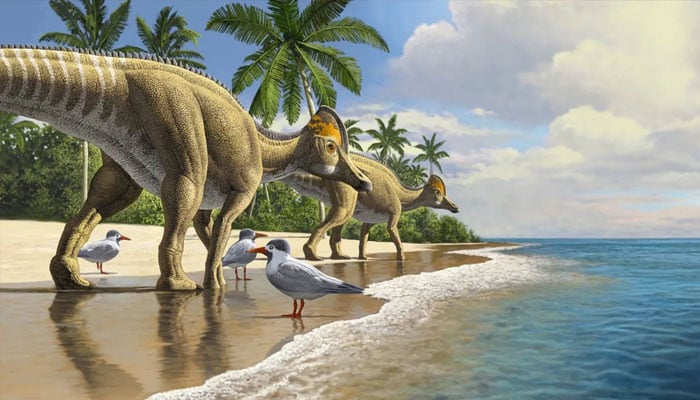Dinosaurs swam vast distances in a million-year survival journey
Study suggests that these dinosaurs swam hundreds of miles between continents
February 23, 2024

A groundbreaking discovery challenges established notions of dinosaur behaviour as palaeontologists uncover fossils of a duck-billed dinosaur, Minqaria bata, in Morocco, GB News reported.
The find suggests these creatures swam hundreds of miles between continents, contradicting the long-held belief that dinosaurs were primarily land-based.
Published in Scientific Reports, the study presents the perplexing link between Europe and Africa, proposing that the species navigated vast distances when Africa stood as an isolated island 66 million years ago, surrounded by water. Previously, it was unimaginable for dinosaurs to undertake such extensive swims.
This new duck-billed species, measuring three to four meters in length and weighing around 250 kg, challenges the understanding of dinosaur capabilities. Three duck-billed species, resembling their European counterparts, have now been identified in North Africa.
Traditionally, duck-billed dinosaurs, or hadrosaurids, emerged in North America during the late Cretaceous period. They later ventured into Europe and Asia through connected landmasses. However, Africa, isolated earlier, was considered inaccessible to these creatures.
Dr Nicholas Longrich from the University of Bath, a report's co-author, suggests that the duckbills floated or swam across vast open waters, covering hundreds of kilometres to reach North Africa. Despite the apparent improbability of such ocean crossings, the findings challenge preconceptions, emphasising that over millions of years, improbable events become probable.
The newly discovered species, Minqaria bata, shares anatomical similarities with European duckbills, indicating a remarkable journey across open waters.
Dr Longrich suggests these dinosaurs might have been social animals, akin to modern birds, forming lively herds along the coasts of Morocco. The discovery defies conventional wisdom, showcasing dinosaurs' dynamic and adaptable nature during the Cretaceous period that spanned nearly 100 million years.











